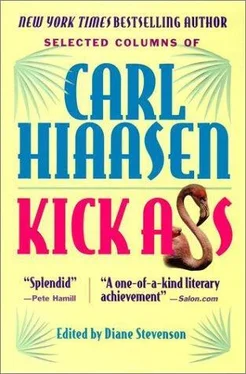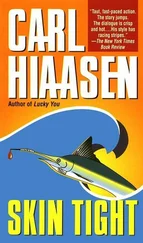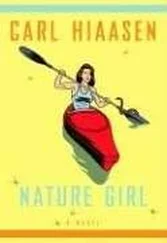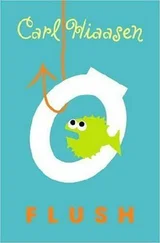Petrona is a Kanjobal Indian, one of about 800 who have resettled in Indiantown as migrants. She is 26, and partially crippled from a childhood disease. She speaks neither English nor Spanish, only the unique Mayan dialect of her village.
The court interpreter, the only one to understand Kanjobal, had learned a language slightly different from Petrona's. Her story, painful to recall under any circumstances, became excruciating in Judge Neale Foster's court.
She wore a beautiful Mayan dress and sat impassively on the witness stand. Often she spoke in little more than a shy whisper. She tried to tell how they had practically skinned her father alive.
In 1982 Petrona's village, El Mul, was caught in Guatemala's vicious civil war. The guerrillas would raid the rural towns for food and chickens; then the army would sweep in, tracking the insurgents and punishing those thought to have aided them.
Defense attorney Peter Upton: "How do you know there was a war?"
Petrona: "Because the helicopters came by."
Q. "What were the helicopters doing?"
A. "They were dropping bombs and shooting bullets."
Later Upton asked: "Did the soldiers ever kill anyone in your family?"
A. "They came and killed my father … he was taken by them and beaten by them … It was 6 in the morning. We were sleeping at the time. They broke down the door."
Petrona said the army men seized her father and two brothers, Esteban and Alonzo, and dragged them away from the others. Alonzo was only 14. Petrona said the soldiers beat them with rifles and hacked them with machetes. She and her mother ran for their lives.
After the soldiers had gone, Petrona said, she came back and found her home burned to the ground. Her brothers and father lay dead. Her father's features were "destroyed." His hands had been bound behind him; Petrona untied the rope.
In all, 11 men were murdered in El Mul that morning. Petrona said she remembered their names, they were her neighbors: Tomas Augustin, his son Daniel, Miguel Jose, Mateo Martin, Esteban Martin, and so on.
After the massacre Petrona eventually fled to Mexico to pick cotton and coffee. From there she made her way to America.
She does not fully understand the politics of her country, but what she knows is this: Men with guns came from the hills and invaded her village. They stole her family's food. Other men in uniforms arrived and stole more. They also slaughtered her father.
As you might imagine, Petrona does not wish to go home.
Kathy Hersh of the American Friends Service Committee says of the Mayans: "They were really caught in the crossnre.They are apolitical.The government doesn't know what to do with them."
Six months ago Guatemala elected its first civilian government since 1966.The United States says this is a new leaf, that the military is enlisting "civil patrols" to improve its image and help battle insurgents. Unfortunately, more than 700 men and women have been murdered in political violence since the new regime came to power.
Petrona seeks asylum here. Her case, and those of other Mayans, probably won't be settled until early next year. The immigration court must decide if the Kanjobales would be singled out for violence if they returned home, if they have a well-founded fear of persecution.
What Petrona Mateo Esteban has is simply a well-founded fear of death.
You've got to have a racket to get asylum
January 8, 1988
Maybe the answer is tennis rackets.
I was wondering what it takes to convince U.S. immigration authorities that Haitians seeking political asylum in this country now have a legitimate claim.
Massacres of voters in the streets apparently are not sufficient evidence of persecution, nor is the assassination of a presidential candidate and attacks on his supporters.
After all the bloodshed and terror, Haitians fleeing to the United States are still being turned back, and many of those here still face deportation.
So I was wondering what it takes to be considered a political refugee, when along comes the case of Madalina Liliana Voinea. She is a ^-year-old tennis player from the Communist-bloc country of Romania.
You'll remember that, shortly before Christmas, Madalina came to Miami Beach to play in the Rolex International Tennis Championships at Flamingo Park. After a scheduling mix-up, she got in a cab, went to the Miami airport and asked for asylum.
You've never seen our government work so fast.
After a two-hour interview, INS district director Perry Rivkind decided that Madalina would face persecution if she went back to her homeland. Said Rivkind: "If she returned, she would be restricted from playing tennis, from going to college, and maybe she would be jailed."
Asylum was promptly granted, a press conference was called and a new media sweetheart was born. Madalina immediately got on a plane to New York, where, according to United Press International, she "spent the day shopping at Saks Fifth Avenue and strolling down Fifth Avenue admiring the window displays."
Personally, I wouldn't want to go back to Romania either, but the haste and fanfare with which the INS welcomed Madalina to America is puzzling to other applicants.
The usual criterion for granting political asylum is a "well-founded fear" of persecution. As human rights violations go, it's hard to compare a machete murder with somebody nixing a six-figure endorsement deal for Puma tennis sneakers.
Madalina came here courtesy of the Romanian government, which regards its promising young athletes as national assets, and treats them accordingly. Compared to most of her countrymen, she led the charmed life. Compared to Haitians, she lived in a paradise.
Based on the examples of Ivan Lendl and Martina Navratilova, it certainly will be easier for Madalina to become a millionaire as an American. This is true for athletes from practically any other country, Communist or not. Everyone wants to play in the United States because there's more money here.
Haiti doesn't produce many international tennis stars, as most people are too busy trying to find food and avoid getting shot by government-backed goons.
Given Madalina's case, if I were scheming to escape Haiti—and who wouldn't be, with the rigged election coming up?—the first thing I'd do is get myself an inexpensive tennis racket.
As soon as I got stopped by the Coast Guard or Border Patrol, I'd tell them that I was a budding tennis star, trying to make it to Wimbledon. I'd say that I could never go back to Haiti—not because of the gross political atrocities, but because they don't have any good grass courts.
What would the INS say to this? Imagine the scene if the next rickety boat to hit our beach delivered 200 people carrying Wilson tennis rackets and asking where's the next tournament.
Something tells me there would be no big press conferences, no happy feature stories, no trip to New York for a stroll down Fifth Avenue.
Somebody in Washington would come up with a new excuse as to why young Madalina Voinea is welcome, and the Haitians are not.
Maybe it would be the tennis rackets themselves. Maybe only refugees playing with graphite get asylum.
Immigration's double standard is an outrage
July 15, 1991
Sen. Connie Mack has arrived at the startling conclusion that U.S. immigration policy appears unfair in its disparate treatment of Haitian and Cuban refugees.
There's a real shocker. The Haitians have been getting shafted for only about a dozen years now. It's nice that somebody in Washington finally noticed.
Mack's moment of revelation came after two outrageous incidents made the double standard impossible to ignore.
On July 7, a Coast Guard cutter intercepted a wooden sailboat packed with 161 Haitian refugees and two Cuban rafters, whom the Haitians had rescued at sea. The Cubans were brought to Miami, while most of the Haitians were returned to Port-au-Prince.
Читать дальше









